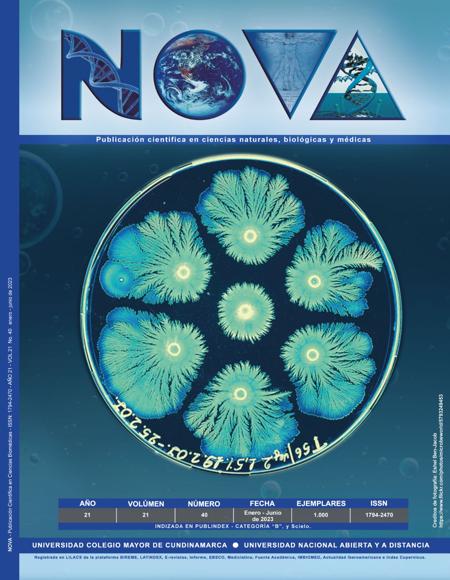Diseño y desarrollo de un ambiente virtual de aprendizaje en ventilación mecánica con práctica teleoperada -VENTYLAB-
Diseño y desarrollo de un ambiente virtual de aprendizaje en ventilación mecánica con práctica teleoperada -VENTYLAB-
NOVA by http://www.unicolmayor.edu.co/publicaciones/index.php/nova is distributed under a license creative commons non comertial-atribution-withoutderive 4.0 international.
Furthermore, the authors keep their property intellectual rights over the articles.
Show authors biography
Introduction: In the context of the Covid-19 pandemic and due to physical distancing restrictions, universities were motivated to set up alternative teaching methods to facilitate the training of health professionals. Objective: To describe the pedagogical considerations for the design and development of a virtual learning environment integrated with technology from a remote laboratory for practical purposes in the training of health professionals on mechanical ventilation issues. Methodology: It is based on a variation of the ADDIE model of instructional design, on which, from the analysis of the context, needs and review of previous experiences, the pedagogical elements are designed for the integration of a Virtual Learning Environment and a ventilatory mechanics emulation system in an environment called Ventylab. Results: Development of an environment for the training of health professionals, designed for the student to apply knowledge of cardiopulmonary pathophysiology in the operation of an invasive mechanical ventilation system. The environment considers educational resources, learning activities, communication, evaluation and interaction with the remote laboratory. Conclusion: The interdisciplinary work for the pedagogical proposal represented a challenge of communication and assembly of different knowledge. This work opens doors for reflection towards the possibility of new teaching practices in university education on issues of mechanical ventilation, as well as methodological application. in other areas of knowledge that require practice.
Article visits 118 | PDF visits 148
Downloads
- Torras Virgili M E. Emergency Remote Teaching: las TIC aplicadas a la educación durante el confinamiento por COVID-19. IJTEI. 2021. Disponible en: https://revistas.uma.es/index.php/innoeduca/article/view/9079
- https://doi.org/10.24310/innoeduca.2021.v7i1.9079
- Panigrahi R, Srivastava P R, Sharma D. Online learning: adoption, continuance, and learning outcome-A review of literature. International Journal of Information Management. 2018; 43, 1-14, ISSN 0268-4012,https://doi.org/10.1016/j.ijinfomgt.2018.05.005
- https://doi.org/10.1016/j.ijinfomgt.2018.05.005
- Klimova B. The use of eLearning in medical education and healthcare practice-A review study. Online Engineering & Internet of Things, 2018; 933-939.
- https://doi.org/10.1007/978-3-319-64352-6_87
- L'Engle K, Raney L, D'Adamo M. mHealth resources to strengthen health programs. Global Health: Science and Practice. 2014; 2(1), 130-131.
- https://doi.org/10.9745/GHSP-D-14-00013
- García Loro F. Evaluación y aprendizaje en laboratorios remotos: propuesta de un sistema automático de evaluación formativa aplicado al laboratorio remoto VISIR . Universidad Nacional de Educación a Distancia (España). Escuela Internacional de Doctorado. Programa de Doctorado en Tecnologías Industriales. 2018
- Calvo I, Zulueta E, Gangoiti U, López J. Laboratorios remotos y virtuales en enseñanzas técnicas y científicas, Ikastorratza, e-Revista de didáctica. 2008; ISSN-e 1988-5911, Nº. 3
- Grodotzki J, Ortelt T R, Tekkaya A E. Remote and virtual labs for engineering education 4.0: achievements of the ELLI project at the TU Dortmund University. Procedia manufacturing. 2018; 26, 1349-1360.
- https://doi.org/10.1016/j.promfg.2018.07.126
- Mar-Cornelio O, Bron-Fonseca B, Gulín-González J. Sistema de Laboratorios Remoto para el estudio de la Microbiología y Parasitología Médica. Revista Cubana de Informática Médica. 2020; 12(2).
- Bhattacharjee A, Johnson E, Perez-Pinera P, Jensen K. Development and implementation of a remote enzyme kinetics laboratory exercise. Journal of microbiology & biology education. 2022; 23(1), e00286-21.
- https://doi.org/10.1128/jmbe.00286-21
- Sharif A, Cho S. Diseñadores instruccionales del siglo XXI: cruzando las brechas perceptuales entre la identidad, práctica, impacto y desarrollo profesional. RUSC. Universities and Knowledge Society Journal. 2015; vol. 12, no 3, p. 72-86.
- https://doi.org/10.7238/rusc.v12i3.2176
- Betancourt-Peña J, Muñoz-Erazo B, Hurtado-Gutiérrez H. Efecto de la rehabilitación pulmonar en la calidad de vida y la capacidad funcional en pacientes con secuelas de tuberculosis. NOVA. 2015; 13(24), 47-54. Disponible en: https://doi.org/10.22490/24629448.1716
- https://doi.org/10.22490/24629448.1716
- Acero J, Ceballos P, Ramirez A, Escobar F. Determinantes Sociales de la falta de Adherencia al Tratamiento de la Tuberculosis en migrantes venezolanos en Colombia, 2018-2019. NOVA. 2022; 20(38). Disponible en: https://doi.org/10.22490/24629448.6185
- https://doi.org/10.22490/24629448.6185
- Gutiérrez Muñoz F. Ventilación mecánica. Acta médica peruana. 2011; 28(2), 87-104.
- Pinzón Aldana M L. Formación integral de los terapeutas respiratorios del Hospital Militar Central en Ventilación Mecánica. 2017. Disponible en http://hdl.handle.net/10654/16131
- Bhute V J, Inguva P, Shah U, Brechtelsbauer C. Transforming traditional teaching laboratories for effective remote delivery-a review. Education for Chemical Engineers. 2021; 35, 96-104.
- https://doi.org/10.1016/j.ece.2021.01.008
- ACMC- Asociación Colombiana de Medicina Crítica. Curso de actualización en ventilación mecánica. [Internet]. [Consultado 3 Jun 2022]. Disponible en: http://www.amci.org.co/22-noticias-cientificas/454-curso-de-actualizacion-en-ventilacion-mecanica
- edX. Ventilación mecánica para pacientes con COVID-19. [Internet]. [Consultado 28 Ago 2022]. Disponible en:
- https://www.edx.org/es/course/respiracion-mecanica-para-covid-19
- Universidad CES. Curso ventilación mecánica para adultos Online. [Internet]. [Consultado 20 Ago 2022] . Disponible en: https://www.ces.edu.co/educacion-continua/curso/curso-ventilacion-mecanica-para-adultos-online/
- Labrador Piquer M J, Andreu Andrés M Á, de Vera C. Metodologías activas. Ediciones Universidad Politécnica de Valencia. 2008.
- Azcuy Lorenz L M, Nápoles Crespo E, Infantes Quiles L, Rivero Rivero M, Ramírez Varona R. Algunas consideraciones teóricas acerca de la Enseñanza Problémica. Humanidades Médicas. 2004; 4(1), 0-0.
- Dahlstrom E, Brooks D, Bischel J. The Current Ecosystem of Learning Management Systems in Education: Student, Faculty, and IT Perspectives. Louisville, CO: ECAR. 2014
- Pérez L D , Miguelena R, Diallo A F. La efectividad de la formación en ambientes virtuales de aprendizaje en la educación superior. Campus virtuales. 2016; 5(2), 10-17.
- Díaz Perera J J, Luna Flores M D, Salinas-Padilla H A. Curso de nivelación algebraica para incrementar el rendimiento académico en estudiantes de ingeniería en un ambiente virtual de aprendizaje. RIDE. Revista Iberoamericana para la Investigación y el Desarrollo Educativo. 2019; 9(18), 456-489.
- https://doi.org/10.23913/ride.v9i18.432
- Annan R A, Aduku L N, Kyei-Boateng S, Yuen H M, Pickup T, Pulman A, Choi S. Implementing effective eLearning for scaling up global capacity building: findings from the malnutrition elearning course evaluation in Ghana. Global health action. 2020; 13(1), 1831794.
- https://doi.org/10.1080/16549716.2020.1831794
- Triana Ortiz K N, Herrera Muñoz D C, Mesa Mendoza W N. Importancia de los laboratorios remotos y virtuales en la educación superior. Documentos De Trabajo ECBTI. 2020; 1(1). https://doi.org/10.22490/ECBTI.3976
- Viegas C, Pavani A, Lima N, Marques A, Pozzo I, Dobboletta E, Alves G. Impact of a remote lab on teaching practices and student learning. Computers & Education. 2018; 126, 201-216.
- https://doi.org/10.1016/j.compedu.2018.07.012
- Gwee M C E. Problem-Based Learning: A Strategic Learning System Design For The Education Of Healthcare Professionals in the 21ST Century. The Kaohsiung Journal of Medical Sciences. 2009; 25: 231-239. https://doi.org/10.1016/S1607-551X(09)70067-1
- https://doi.org/10.1016/S1607-551X(09)70067-1
- INACSL Standards Committee. INACSL Standards of Best Practice: Simulation SM Simulation-enhanced interprofessional education (sim-IPE). Clinical Simulation in Nursing. 2016; 12(S), S34-S38. http://dx.doi.org/10.1016/j.ecns.2016.09.011.
- https://doi.org/10.1016/j.ecns.2016.09.011
- Millan P, Yunda P, Valencia A. Análisis de factores económicos y empresariales que influyen la Innovación Disruptiva en Telesalud. NOVA. 2017; 15(28), 125 - 136. https://doi.org/10.22490/24629448.2136
- https://doi.org/10.22490/24629448.2136
- Bonavolontà F, D'Arco M, Liccardo A, Tamburis O. Remote laboratory design and implementation as a measurement and automation experiential learning opportunity. IEEE Instrumentation & Measurement Magazine. 2019; 22(6), 62-67.
- https://doi.org/10.1109/MIM.2019.8917906






